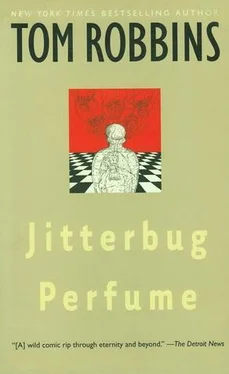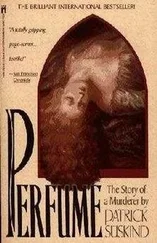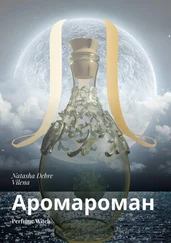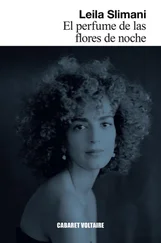Kudra had the odd feeling that she had been there before. Alobar stared into the lacquered grapes of her eyes and asked if the name “Wren” meant anything to her. “Nothing,” she insisted. They didn't speak of it again, but the déjà kept right on vu ing. Once, Alobar saw a huge hound at a distance. “Mik!” he cried, running after it. The dog turned on him and might have chewed off some of his best parts had not its owner intervened. Ghosts are good for short-term thrills, in the long run they're boring. Alobar and Kudra departed for Aelfric, but not before purchasing a sack of beets.
Aelfric was four or five times its previous size. It had a wall around it. “Why do you wish to enter here?” asked a soldier at the gate where orchards used to stand. Alobar peeked in at the narrow, crooked streets, deep in garbage, flowing with sewage; dark shadows enlivened by the chirping of rats. If this is what people must resort to in order to operate their shops and worship their Jesus, perhaps they should return to the hunt and the morning star , thought Alobar. “State your business,” demanded the guard. By then, Alobar had lost considerable interest in searching for his progeny. “Bandaloop business,” he said brightly. The guard scowled, but his feet executed an abrupt and completely involuntary dance step, leaving the soldier staring at his own boots, as if he might arrest them for lewd conduct, or, at least, insubordination. Alobar and Kudra hurried away only to pause a short while later near the place where the shaman had lived.
“Why are we stopping in this field?” asked Kudra.
“I have to replace a door,” replied Alobar, but what he did was build a fire and roast beets.
“I take it we are not to explore Aelfric,” said Kudra.
“Wasn't a glimpse enough? If your grandchildren were citizens of Aelfric, would you be anxious to meet them?”
“Maybe. Out of curiosity.”
“My curiosity does not extend to dung beetles, even if they crawled out of my family tree. Besides, if I am truly immortal, I am my own grandchild, my own descendant, my own dynasty. I am not obliged to live on through what I pass down to others.”
“Then pass me a beet,” said Kudra. And he did.
The Middle Ages hangs over history's belt like a beer belly. It is too late now for aerobic dancing or cottage cheese lunches to reduce the Middle Ages. History will have to wear size 48 shorts forever.
In the pit of that vast stomach — sloshing with dark and vinegary juices, kindled by a thousand-year heartburn — major figures stimulated acute contractions, only to be eventually digested, adding to the bloat. Clovis, Charlemagne, Otto I, William the Conqueror, Rurik the Viking, Pope Leo, Thomas Aquinas, Johann Gutenberg, and a platter of other renowned generals, kings, philosophers, and popes fermented and dissolved in that mammoth maw. Our little couple, however, our Alobar and Kudra, remained intact and indigestible, like the hard octopus beaks that sicken the stomachs of whales, causing them to vomit the ambergris that bonds the bouquet in great perfumes. Like octopus beaks, our couple. Or maraschino cherries.
More than a decade after his death, Nikolai Lenin's body was removed from its sepulcher in the Kremlin and a belated autopsy performed. Four maraschino cherries were found in Lenin's colon. Perfectly preserved, as whole and candy red as the day (or days) that he swallowed them, the cherries were in better shape than Lenin himself. It is rumored that maraschino cherries are prepared with a chemical resembling formaldehyde, thus can neither be assimilated nor eliminated but must ride in the baggage rack of the bowels for a lifetime, like the seabags of the Flying Dutchman . If that is the case, and one is prepared to believe the worst of maraschino cherries, looking, as they do, as if they were picked in the orchards of Pluto; as if they were carved out of spoiled neon; as if they were vegetable visitors from the twenty-third century, beamed here to make us appreciate our old-fashioned beets; if it is true, then we could say that Alobar and Kudra were maraschino cherries lodged in the tubes of history's paunch.
On the other hand, octopus beaks, pointing to the birth of future fragrances, might be a more accurate and lyrical analogy.
At any rate, Alobar and Kudra survived wars, robbers, fires, pillages, plagues (including the Black Death of 1347–1350) and the intolerances of the Church; survived freezing winters, famines, Gothic art, and uncomfortable furniture; survived, most importantly, the “natural” process of aging, which, according to Dr. Wiggs Dannyboy, is so unnaturally cruel that only man could have ordained it — neither nature nor God would stoop so low.
Should one be shallow enough to view existence as a system of rewards and punishments, one soon learns that we pay as dearly for our triumphs as we do for our defeats, and the couple's victory over aging created as many problems for them as did witch-hunts and feudal strife. Nowhere could they remain for more than a decade or two. In those rough times, people aged even faster than we do today, making it all the more noticeable when Kudra's and Alobar's gums remained a-bristle with teeth. They did their best to maintain a low profile, but, let's face it, they weren't the most inconspicuous pair to mosey down the medieval pike. For one thing, they were obviously frying with love and lust for one another in an age when romance simply did not exist within the bounds of matrimony. Virtually all marriages in the Middle Ages were arranged between strangers, and the Church disallowed divorce. Therefore, romantic love was almost exclusively a function of adultery. It was for adulterers that troubadours sang their courtly ballads, it was for the attention of another fellow's wife that the jouster risked the lance. When Alobar and Kudra refused to participate in the continental pastime (in their centuries together, Alobar was cuckolded only by Pan, and that was not precisely cuckoldry, that was. . something else), it escalated the suspicions already aroused by her exotic coloration and his regal manner, by their funny way of breathing and their tendency to wash. So they were obliged to keep moving. A few years in Heidelberg, a few near Rome; green seasons in Flanders, dry seasons on Crete. Fortunately, they subscribed to no magazines. The post office would have gone nuts.
Early in the 1300s, attending the fair at Beaucaire in the south of France, they encountered a group of people whose proclivity for travel made Kudra and Alobar seem as though they were chained to a stump. These nomads rumbled from town to town, fair to fair, in brightly colored wagons. Variously called Logipciens, Bohemians, or Gypsies, they were ostensibly itinerant metalworkers, but music and magic were their true vocations. Although the Gypsies were new to Europe, Kudra had known them in India and could converse in their dialect. Moreover, her pigmentation was the same shade as theirs. Their chief invited her to join them. Reluctantly, he agreed to include Alobar.
For the next half-century (time flies when you're having fun), they lived as Gypsies, bumping over the quasi-roads of the continent in a red and orange donkey cart, sleeping in a tent of woven fabrics kept precariously in place by stones, warming themselves with tezek , that charming fuel made of cow dung and straw. They indulged in some serious horseshoeing and harness making, but more frequently their band earned its living amusing, and sometimes fleecing, visitors to holy sites, festivals, and fairs. The Gypsies danced, they sang and strummed, they navigated a pea beneath a walnut shell so slickly you'd wager your last sou that it was beneath the one next door. When they shook their tambourines and sistrums, in voluptuous poses, feudal barons found them irresistible, but that made them all the more hateful in the eyes of the pious and grave, a reaction that was for Alobar a source of endless delight. Kudra chided him for it mildly, but he was rarely happier than when savoring the fear and disgust that welled up in proper Christians at the sight of their rattling, tinkling troupe.
Читать дальше












